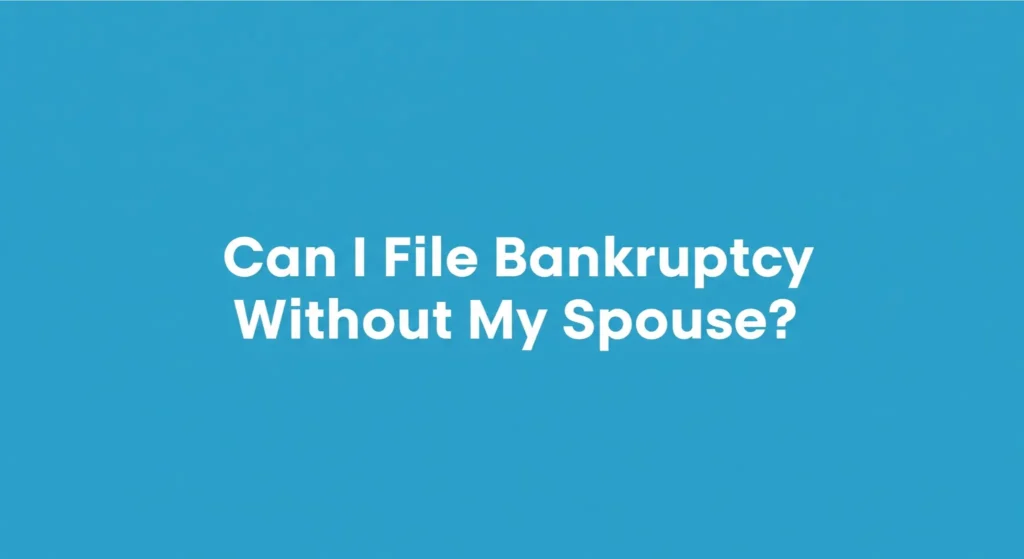Can I File Bankruptcy Without My Spouse?

The Short answer: Yes.
The Smarter answer: Whether filing Bankruptcy without your spouse is the right decision depends on your assets, income, and whether Chapter 7 or Chapter 13 is the best option. Let’s walk through it together.
Why Nevada’s Community Property Laws Matter

What does that mean for a solo filing:
Bank/investment accounts opened during marriage may be considered community property.
Vehicles and
real estate bought (or paid down) during marriage can be community property.
Debts during marriage—like credit cards or medical bills—can be seen as marital debts.

Chapter 7 vs. Chapter 13 — What’s the Difference?
Chapter 7 (“fresh wipe” for many unsecured debts)


Chapter 13 (“repay over time & keep stuff”)


Will My Spouse’s Income Count?


Will My Filing Bankruptcy Hurt My Spouse’s Credit?



Real-Life Scenarios
1) Joint Credit Cards & Loans.

2) A Home You Own Together.


3) Only One Spouse Has Significant Debts


4) Co-Signed Car

- Pay & drive: keep paying under the original terms to keep the car.
- Reaffirmation: makes you legally liable again—Nevada judges rarely favor this, so it is used sparingly.
- Surrender: walk away if it’s unaffordable (co-signer may still be on the hook, but the debt may be uncollectable, as explained above).
- Chapter 13: can sometimes restructure the loan and lower payments.
“Redemption” (refinancing at current value) typically isn’t available if the car loan is joint and only one of the borrowers files a Bankruptcy.
5) “Phantom Discharge” Note

Pre-Filing Checklist

- Which debts are joint vs. individual?
- What is separate property vs. community property?
- Pull both credit reports; fix errors by filing disputes with the credit reporting companies.
- Gather: last 2 years of tax returns, recent pay stubs (yours + spouse’s), bank statements, mortgage/auto statements, retirement summaries, and a detailed monthly budget.
- Confirm Nevada exemptions that apply.
Nevada Exemptions (Highlights)

Homestead: up to $605,000 in equity in your primary residence (ownership/occupancy rules apply).
Vehicle: up to $15,000 in equity in one vehicle per filing individual.
Household Goods: up to $12,000 in equity in furniture, clothing, electronics, etc.
Jewelry / Art / Instruments: up to $12,000 in equity.
One Firearm &
Family Keepsakes: unlimited equity (but only one firearm).
- Filing together can allow both spouses to double the value of some, but not all, of their state exemptions. But filing alone limits you to only one set.
When to Talk to a Nevada Bankruptcy Attorney

- Most debts are joint, or you share significant assets.
- Your home equity is close to the exemption limit.
- You’re borderline on Chapter 7 eligibility.
- You want to keep your home/car but need to catch up safely.
A short consult can prevent expensive mistakes—and help you choose solo vs. joint Filing based on your goals.
FAQs
Q: Will my spouse’s credit be affected if I file alone?
A: Not directly, unless they’re on the debt. Joint accounts can still be collected from your spouse; missed payments can impact their score.
Q: Can we keep our home if only one of us files?
A: Often yes—thanks to Nevada’s generous homestead exemption (up to $605,000). The exact results depend on your equity, liens, and chapter. Of course, you must continue paying your mortgage loan and keep current to avoid triggering a foreclosure.
Q: Will the court count my spouse’s income if they don’t file?
A: Yes, if you live together. But your spouse’s separate expenses can often be deducted.
Q: What happens to shared property if I file solo?
A: Community property is part of the bankruptcy estate. Exemptions and your chapter determine whether it’s protected or sold by a Chapter 7 Trustee. Most of the time, even the exemptions for one person will completely protect all your property, but, of course, there will always be exceptions.
What to Do Next: Taking Control of Your Debt

Get clear on understanding your numbers (debts, assets, income, budget).
Decide your top goals (keep the home, protect spouse’s credit, wipe credit cards).
Talk with a local attorney who knows Nevada’s community property rules.
Why Work With A Fresh Start Law
Local Knowledge: Deep experience with Las Vegas & Henderson bankruptcy cases.
Personalized Plans: Chapter 7, Chapter 13, or alternatives—what fits you.
Compassionate Support: You’re more than your debts. We’re here to help you breathe easier.
Let’s Talk About Your Fresh Start

Hope this perspective helps!

This page contains general information only and is not legal advice. Exemptions and outcomes depend on your specific facts. For advice, please consult a licensed bankruptcy attorney in your community.
 Bank/investment accounts opened during marriage may be considered community property.
Bank/investment accounts opened during marriage may be considered community property. Vehicles and
Vehicles and  Debts during marriage—like credit cards or medical bills—can be seen as marital debts.
Debts during marriage—like credit cards or medical bills—can be seen as marital debts. “Redemption” (refinancing at current value) typically isn’t available if the car loan is joint and only one of the borrowers files a Bankruptcy.
“Redemption” (refinancing at current value) typically isn’t available if the car loan is joint and only one of the borrowers files a Bankruptcy. Household Goods: up to $12,000 in equity in furniture, clothing, electronics, etc.
Household Goods: up to $12,000 in equity in furniture, clothing, electronics, etc. Jewelry / Art / Instruments: up to $12,000 in equity.
Jewelry / Art / Instruments: up to $12,000 in equity. One Firearm &
One Firearm &  Family Keepsakes: unlimited equity (but only one firearm).
Family Keepsakes: unlimited equity (but only one firearm). Decide your top goals (keep the home, protect spouse’s credit, wipe credit cards).
Decide your top goals (keep the home, protect spouse’s credit, wipe credit cards). Personalized Plans: Chapter 7, Chapter 13, or alternatives—what fits you.
Personalized Plans: Chapter 7, Chapter 13, or alternatives—what fits you. Compassionate Support: You’re more than your debts. We’re here to help you breathe easier.
Compassionate Support: You’re more than your debts. We’re here to help you breathe easier.